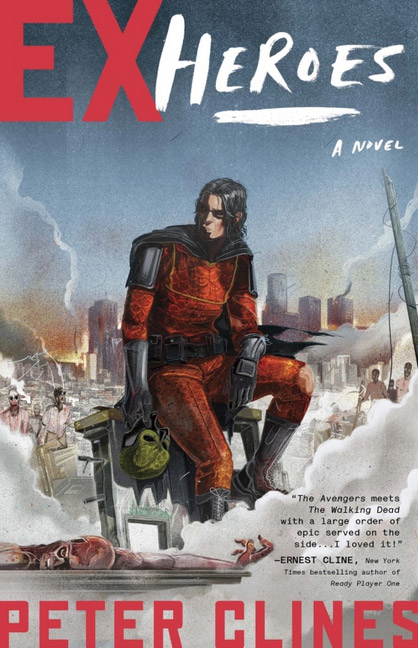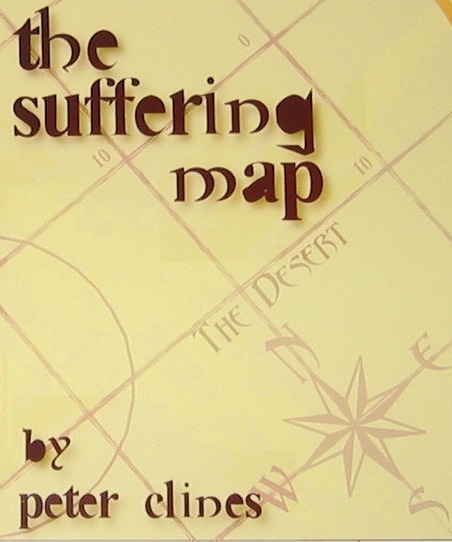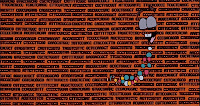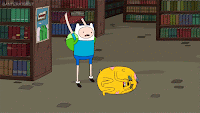Okay, one last start-of-the-year post. I promise. I won’t ask you to think about anything else writing-related.
Well, not until next week. But that’ll be different stuff.
Last week I talked about process and diminishing returns. That maybe the way I’m doing things right now—no matter how long I’ve been doing them—might not be the best way for me to do things. Maybe just for this project, maybe… overall. Sometimes we just need to look at what we’re doing and how we’re doing it and figure out if there’s room for improvement.
The catch here, of course, if I have to be willing to improve. I have to acknowledge there’s a problem that needs to be fixed. Or at least a rough spot that could use some sanding or lubrication or something.
And like I mentioned before, that can be tough. Nobody wants to admit they’ve been doing things wrong or that they’ve possibly wasted a lot of time beating their head against a wall when the door was right over there. I mean, it even had a bright red exit light over it.
So look… here’s four things I should be willing to graciously acknowledge about my writing.
1) My first attempts at writing aren’t going to be good
When we first start writing, it’s tough to admit something we wrote isn’t good. We put in the time and the effort (okay, maybe we only put in one of those) and ended up with a solid three pages that were… mediocre, maybe. Possibly just bad.
But this isn’t anything to be bothered by or ashamed of. It’s normal. You didn’t expect to make a perfect three-layer cake the first time you tried. Didn’t think the first time you started jogging it’d be as effortless as some runners make it look. Why would writing be any different?
None of us like to be the clumsy rookie, but the fact is it’s where everyone starts. Especially in the arts. People love to tell stories about those gifted prodigies who won awards and prizes with their first attempt at something, but the truth is most of them are just that—stories. It’ s folks cherry picking (or ignoring) the facts to create a narrative that helps them push an idea. Sure, there’s a few actual gifted amateurs out there—very, very few—but the vast majority of us have to work at something to get good at it.

You noticed I said “us,” right? Lots of folks think of Ex-Heroes is my first attempt at a novel, but it wasn’t. There was the very clumsy early work Lizard Men from the Center of the Earth, a super-derivative sci-fi novel called A Piece of Eternity, a puberty-fueled fantasy novel (embarrassing on a number of levels), some Star Wars and Doctor Who fanfic, The Werewolf Detective of Newbury Street, The Trinity, The Suffering Map, about half of a novel called Mouth… and then Ex-Heroes.
And I can tell you without question that most of those sucked. In many different ways. It doesn’t mean I didn’t try to sell some of them (we’ll get to that in a minute), but I couldn’t improve as a writer until I accepted that I needed improvement.
2) My first draft isn’t going to be good
There was a point where I ‘d fret over my writing. I’d worry about individual words, each sentence, every paragraph. I’d get halfway down the page and then go back to try to rewrite the first paragraph. And then I’d get to the bottom of the page and rewrite it again. My productivity was slowed to a crawl because I kept worrying about what had happened in my story instead of what was going to happen.
It was a very freeing moment for me when I realized my first draft was pretty much always going to suck. And that’s okay. Everybody’s first draft sucks. We all have to go back and rework stuff, no matter how long we’ve been doing this. Everyone. I’ve seen some folks argue that they don’t technically do drafts, per se, but if you look close even they admit they rewrite a lot.
Once I could admit that and shrug off all those worries about word choice and sentence structure and dialogue and everything else… well, it became a lot easier for me to finish a first draft. Which meant I could do a second draft and a third draft. And then maybe even sell something.
3) My writing’s going to need editing
Okay, this seems like an obvious second half of the last admission, doesn’t it? If my first draft is bad, clearly it’s going to need some editing. Thing is, there’s a lot of folks who hear “it’s bad” and immediately move on to the next thing (I’ve got a whole school of thought about why this is, but that’s a different topic). Because my writing is perfect, so you saying it’s bad must mean there’s some inherent flaw in the plot or the characters that would mean rewriting the whole thing and who has time for that?
Look, we miss a lot of stuff on a first draft. On reflection, that character may be a bit of a stereotype. That dialogue could be a little sharper. I use that one turn of phrase a lot. I mean, seriously, it’s in every chapter.
And holy crap. Chapter nine? What was I even thinking? That’s just gone. Deleting the whole thing. Best if nobody ever sees that. It seemed like I needed it at the time but now that we’re doing this whole “admitting” thing… yeah, it should go. Doesn’t matter that I spent three days writing it. Gone. Remember to fix all those chapter numbers now…
Truth is, the editing is where we actually start to get better. It doesn’t happen by going to seminars or reading how-to books, it happens by sitting down and working on the writing until it’s better. And sometimes, yeah, it takes time and effort and multiple tries to make things work. Worse yet, no matter how much we learn, we’ll always find new mistakes to make and new things we can mess up.
Ha ha ha, you say. Well, only for so long, right? Eventually I’ll hit the point where I’ve figured it all out and writing holds no more mysteries. I will solve writing, yes?
Ehhhh, not really.
One of our goals is to come up with something new. We’re going to try these characters in that setting, this plot with those characters, maybe even some types of characters I’ve never tried writing before. And all these new combinations mean new things to learn and new mistakes to make in my early attempts. Running some quick and kind of horrying numbers, I can safely say I’ve been trying to tell stories for over forty-five years now (which is really weird when you consider I’m definitely still in my late thirties) and I really wish I had this down to a science. But the truth is I just finished a major rewrite on a book that’d already gone through four drafts. Because… well, it needed the editing.
4) My writing’s going to be rejected
Look, not everything’s going to appeal to everyone. Doesn’t mean it’s bad, it’s just that people have different tastes. They have different moods. No matter how hard we try to be fair, we like and dislike things for random reasons. Maybe it was a good story but the main character has the same name as an ex things ended really poorly with. Maybe I’d just seen one too many journal-style stories that week. Heck, maybe I had mild food poisoning at the time.
Good stuff gets rejected sometimes. It’s just a fact of life. Heck, even with the list of publishing credits I’ve got now, I’ve had short stories rejected, book proposals, comic proposals, all sorts of stuff. Rejection got less painful once I realized it wasn’t some personal attack, just a person who didn’t connect with my story at that moment for some reason.

Also probably worth admitting the ugly truth. Sometimes we also get rejected because… well, our stuff’s just not that good. Two agents asked to see The Suffering Map and both sent me a polite “sorry, not for me” letter. And they were (in retrospect) 100% right to do so. It wasn’t a great book and it had a lot of problems.
Oh, and please don’t fall into the trap of thinking something’s automatically good because it got rejected. We’ve all seen the folks who see rejection as proof their book is too good for those agents and Big Five publishers. We’re being honest here and admitting the truth, remember?
Y’see Timmy, if I can admit some of these things to myself, it can only make me a better, stronger writer. These aren’t flaws I have to wear forever like a big red letter A. Really, if I look at the above statements and my gut reaction is “Well, yeah, but this doesn’t apply to me,” it’s probably a good sign I’m not admitting some thing to myself.
So as you step fully into this new year, take a good look at your writing, and be willing to acknowledge what’s there.
Next time, I may blather on about first drafts a little more. Or tabletop games. Or maybe something else, if anyone has requests.
Until then, go write.










